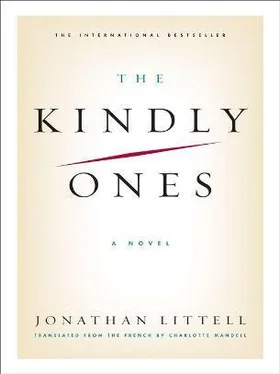Jonathan Littell - The Kindly Ones
Здесь есть возможность читать онлайн «Jonathan Littell - The Kindly Ones» весь текст электронной книги совершенно бесплатно (целиком полную версию без сокращений). В некоторых случаях можно слушать аудио, скачать через торрент в формате fb2 и присутствует краткое содержание. Год выпуска: 2009, ISBN: 2009, Издательство: HarperCollins e-books, Жанр: Историческая проза, на английском языке. Описание произведения, (предисловие) а так же отзывы посетителей доступны на портале библиотеки ЛибКат.
- Название:The Kindly Ones
- Автор:
- Издательство:HarperCollins e-books
- Жанр:
- Год:2009
- ISBN:978-0-06-177548-2
- Рейтинг книги:4 / 5. Голосов: 1
-
Избранное:Добавить в избранное
- Отзывы:
-
Ваша оценка:
- 80
- 1
- 2
- 3
- 4
- 5
The Kindly Ones: краткое содержание, описание и аннотация
Предлагаем к чтению аннотацию, описание, краткое содержание или предисловие (зависит от того, что написал сам автор книги «The Kindly Ones»). Если вы не нашли необходимую информацию о книге — напишите в комментариях, мы постараемся отыскать её.
The Kindly Ones The Kindly Ones Massive in scope, horrific in subject matter, and shocking in its protagonist, Littell's masterpiece is intense, hallucinatory, and utterly original. Critics abroad have compared this provocative and controversial work of literature to Tolstoy's War and Peace, a classic epic of war that, like The Kindly Ones, is a morally challenging read.
The Kindly Ones — читать онлайн бесплатно полную книгу (весь текст) целиком
Ниже представлен текст книги, разбитый по страницам. Система сохранения места последней прочитанной страницы, позволяет с удобством читать онлайн бесплатно книгу «The Kindly Ones», без необходимости каждый раз заново искать на чём Вы остановились. Поставьте закладку, и сможете в любой момент перейти на страницу, на которой закончили чтение.
Интервал:
Закладка:
Such amateurishness soon became the exception. As the weeks went by, the officers acquired experience, and the soldiers got used to the procedures; at the same time, one could see that everyone was searching for his place in all this, thinking about what was happening, each in his own way. At table, at night, the men discussed the actions, told anecdotes, and compared their experiences, some sadly, others cheerfully. Still others were silent; they were the ones who had to be watched. We had already had two suicides; and one night, a man woke up emptying his rifle into the ceiling, he had to be held down by force, and a noncom had almost been killed. Some reacted with brutality, sometimes sadism: they struck at the condemned, tormented them before making them die; the officers tried to control these outbursts, but it was difficult, there were excesses. Very often our men photographed the executions; in their quarters, they exchanged their photos for tobacco, or stuck them to the wall—anyone could order prints of them. We knew, through the military censors, that many of them sent these photos to their families in Germany; some even made little albums of them, with captions; this phenomenon worried the hierarchy but seemed impossible to control. Even the officers were losing their grip. Once, while the Jews were digging, I surprised Bohr singing: “The earth is cold, the earth is sweet, dig, little Jew, dig deep.” The Dolmetscher was translating; it shocked me deeply. I had known Bohr for some time now, he was a normal man, he had no particular animosity against the Jews, he did his duty as he was told; but obviously, it was eating at him, he wasn’t reacting well. Of course there were some genuine anti-Semites in the Kommando: Lübbe, for example, another Untersturmführer, seized the slightest occasion to rant against the Hebrews with extreme virulence, as if the whole of world Judaism were nothing but a vast conspiracy aimed at him, Lübbe. He tired everyone out with this. But his attitude toward the actions was strange: sometimes he behaved brutally, but sometimes in the morning he was overcome with violent diarrhea; he would report sick and had to be replaced. “God, how I hate those vermin,” he said as he watched them die, “but what a filthy job.” And when I asked him if his convictions didn’t help him bear it, he retorted: “Listen, just because I eat meat doesn’t mean I want to work in a slaughterhouse.” He was transferred anyhow, a few months later, when Dr. Thomas, the replacement for Brigadeführer Rasch, purged the Kommandos. But increasingly the officers as well as the men were becoming hard to control; they thought they were allowed to do all sorts of things, unimaginable things—and this is probably normal, with this sort of work the boundaries get confused, grow vague. And then there were some who stole from the Jews, kept gold watches, rings, money, even though everything was supposed to be turned in to the Kommandostab to be sent to Germany. During the actions, the officers were obliged to watch the Orpos, the Waffen-SS, the Askaris, to make sure they didn’t make off with anything. But officers too kept things. And also they drank, the sense of discipline started to unravel. One evening, we were billeted in a village, Bohr brought back two girls, Ukrainian peasants, and some vodka. He and Zorn and Müller started drinking with the girls and feeling them up, putting their hands under their skirts. I was sitting on my bed and trying to read. Bohr called to me: “Come take your fill too.”—“No, thanks.” One of the girls was unbuttoned, half naked, her flabby breasts drooped a little. This sour lust, this sagging flesh, disgusted me, but I had nowhere to go. “You’re not much fun, Doktor,” Bohr snapped at me. I looked at them as if I had X-ray vision: beneath the flesh I could clearly make out the skeletons; when Zorn embraced one of the girls it was as if their bones, separated by a thin gauze, knocked together; when they laughed, the grating sound burst forth from the jaws in the skulls; tomorrow, they would already be old, the girls would grow obese or, on the contrary, their exhausted skin would hang on their bones, their dry, empty teats would fall like a drained wine skin, and then Bohr and Zorn and these girls too would die and be buried under the cold earth, the soft earth, just like all those Jews mowed down in the prime of life, their mouths full of earth would laugh no more, so what was the use of this sad debauchery? If I asked Zorn that question, I knew what he’d say: “Just that: to have a little fun before I croak, nothing more, just a little pleasure,” but I had nothing against pleasure, I too could take my pleasure when I wanted it, no, it was probably their terrifying lack of self-awareness, that surprising way of never thinking about things, good or bad, of letting themselves be carried along with the current, killing without understanding why and without caring either, groping women because they were willing, drinking without even seeking to be absolved of their bodies. That is what I didn’t understand, but no one was asking me to understand anything.
In the beginning of August, the Sonderkommando conducted a preliminary cleansing of Zhitomir. According to our statistics, thirty thousand Jews lived there before the war; but most of them had fled with the Red Army, so no more than five thousand remained, 9 percent of the present population. Rasch had decided that was still too many. General Reinhardt, who commanded the Ninety-ninth Division, lent us some soldiers for the Durchkämmung , a fine but untranslatable German word that suggests a sifting-through. Everyone was a little tense: on August 1, Galicia had been reunited to the Generalgouvernement and the Nachtigall regiments had rebelled as far as Vinnitsa and Tiraspol. All the OUN-B officers and noncoms among our auxiliaries had to be identified, arrested, and sent along with the officers of the Nachtigall to join Bandera in Sachsenhausen. Since then, we had to keep an eye on the remaining ones, not all of them could be trusted. In Zhitomir itself, some Bandera supporters had assassinated two pro-Melnyk officials that we had put in place; at first, suspicion had fallen on the Communists; then we had shot all the OUN-B supporters we could find. Fortunately, our relations with the Wehrmacht were turning out to be excellent. The veterans of Poland were surprised at this; they had expected at best a grudging consent, but now our relations with the various headquarters were growing positively cordial. Often it was the army that took the initiative for actions; they asked us to liquidate the Jews in villages where acts of sabotage had taken place, as retaliation or because the Jews were regarded as partisans, and they turned over Jews and Gypsies to us to execute. Von Roques, the commander of the Rear Army Group Area South, had given the order that if the authors of some act of sabotage couldn’t be identified with certainty, we should conduct reprisals against Jews or Russians, since we shouldn’t arbitrarily blame the Ukrainians: We must convey the impression that we are just . Of course, not all the officers of the Wehrmacht approved of these measures; the older officers especially, according to Rasch, still lacked understanding. The Group was also having some problems with certain Dulag commanders, who were reluctant to hand over Commissars and Jewish prisoners of war to us. But von Reichenau, it was known, defended the SP vigorously. And sometimes, on the contrary, the Wehrmacht outdid us. The HQ of one division wanted to set up in a village, but there wasn’t enough room: “We still have the Jews,” their Chief of Staff suggested to us; and the AOK supported his request, so we had to shoot all the male Jews in the village, then regroup the women and children into a few houses so as to free up some quarters for the officers. In the report this was listed as a retaliation. Another division went so far as to ask us to liquidate the patients of an insane asylum they wanted to occupy; the Gruppenstab replied indignantly that the Staatspolizei are not hangmen for the Wehrmacht : “No interest of the SP makes this action necessary. Do it yourselves.” (Yet, another time, Rasch had had some lunatics shot because all the hospital guards and nurses had left, and he thought that if the patients took advantage of this to escape, they would constitute a security risk.) What’s more it looked like things were soon going to get worse. Rumors reached us from Galicia about new methods : Jeckeln, apparently, had received considerable reinforcements and was conducting much more extensive cleansings than anything that had been undertaken till then. Callsen, back from a mission in Tarnopol, had vaguely mentioned a new Ölsardinenmanier to us, but he refused to elaborate, and no one really knew what he was talking about. And then Blobel had returned. He was cured, and in fact seemed to drink less, but he was just as quarrelsome as ever. I now spent most of my time in Zhitomir. Thomas was there too and I saw him almost every day. It was very hot. In the orchards, the trees bowed under the weight of the purple plums and the apricots; in the individual plots, on the outskirts of the city, you could see the heavy masses of pumpkins, a few ears of corn already dried out, some isolated rows of sunflowers, their heads bent to the ground. When we had some free time Thomas and I left the city to take a boat out on the Teterev and swim; then, lying under the apple trees, we drank bad white wine from Bessarabia and bit into ripe fruit, always within arm’s reach in the grass. At that time there weren’t yet any partisans in the region, so it was calm. Sometimes we read curious or amusing passages out loud to each other, like students. Thomas had unearthed a French pamphlet from the Institut d’Études des Questions Juives , the Institute for the Study of Jewish Questions. “Listen to this amazing prose. Article on ‘Biology and Collaboration,’ by a certain Charles Laville. Here it is. A policy must be biological or not exist . Listen, listen: Do we want to remain a common polypary? Or do we on the contrary want to move toward a superior stage of organization? ” He read in French with an almost singsong accent. “Answer: The cellular associations of elements with complementary tendencies are what have permitted the formation of superior animals, up to man. To refuse that which is now offered to us would be, in a way, a crime against humanity, as well as against biology. ” For my part, I was reading Stendhal’s correspondence. One day, some sappers invited us onto their motorboat; Thomas, already a little drunk, had wedged a crate of grenades between his thighs and, comfortably stretched out in the bow, he fished them up one by one, took the pin out, and tossed them lazily over his head; the gushes of water thrown up by the underwater detonations splashed over us, while the sappers, armed with nets, tried to catch the dozens of dead fish that bobbed up in the wake of the boat; they laughed, and I admired their tanned skin and careless youth. At night, Thomas sometimes came to our quarters to listen to music. Bohr had found a young Jewish orphan and had adopted him as a mascot: the boy washed the cars, polished the officers’ boots, and cleaned their pistols, but above all he played the piano like a young god, light, nimble, cheerful. “Fingers like that excuse everything, even being Jewish,” Bohr said. He had him play Beethoven or Haydn, but the boy, Yakov, preferred Bach. He seemed to know all the suites by heart, it was wonderful. Even Blobel tolerated him. When Yakov wasn’t playing, I sometimes entertained myself by jokingly taunting my colleagues, I read them passages from Stendhal about the retreat from Russia. Some of them took offense: “Yes, the French, maybe, they’re good for nothing. But we are Germans.”—“Certainly. But the Russians, however, are still Russians.”—“Not at all!” Blobel blurted out. “Seventy or eighty per cent of the population of the USSR are of Mongol stock. It’s proven. And the Bolsheviks had a policy of deliberate racial mixing. During the Great War, yes, we fought against authentic Russian muzhiks , and it’s true they were tough bastards, real bruisers, but the Bolsheviks exterminated them! There are almost no real Russians, real Slavs left. In any case,” he went on without any logic, “the Slavs are by definition a mixed race, a race of slaves. Of bastards. Not a single one of their princes was really Russian, it was always Norman, Mongol, then German blood. Even their national poet was a negro Mischling , and they tolerate it, that’s proof…”—“In any case,” Vogt added sententiously, “God is with the German nation and the Volk . We cannot lose this war.”—“God?” Blobel spat out. “God is a Communist. And if I ever meet him, he’ll end up like his Commissars.”
Читать дальшеИнтервал:
Закладка:
Похожие книги на «The Kindly Ones»
Представляем Вашему вниманию похожие книги на «The Kindly Ones» списком для выбора. Мы отобрали схожую по названию и смыслу литературу в надежде предоставить читателям больше вариантов отыскать новые, интересные, ещё непрочитанные произведения.
Обсуждение, отзывы о книге «The Kindly Ones» и просто собственные мнения читателей. Оставьте ваши комментарии, напишите, что Вы думаете о произведении, его смысле или главных героях. Укажите что конкретно понравилось, а что нет, и почему Вы так считаете.










